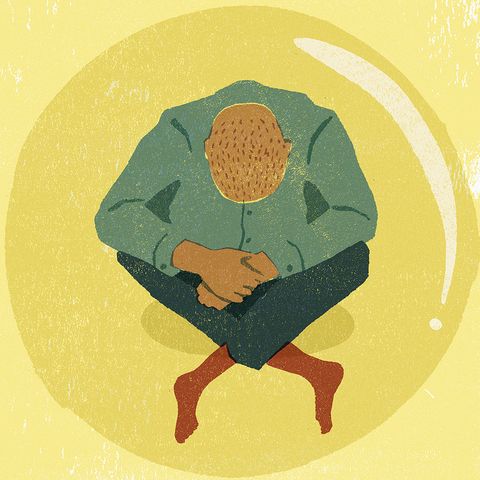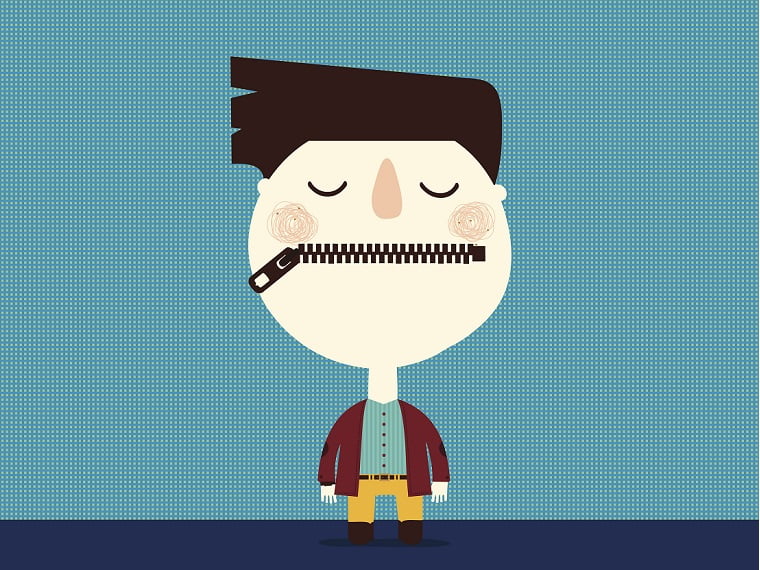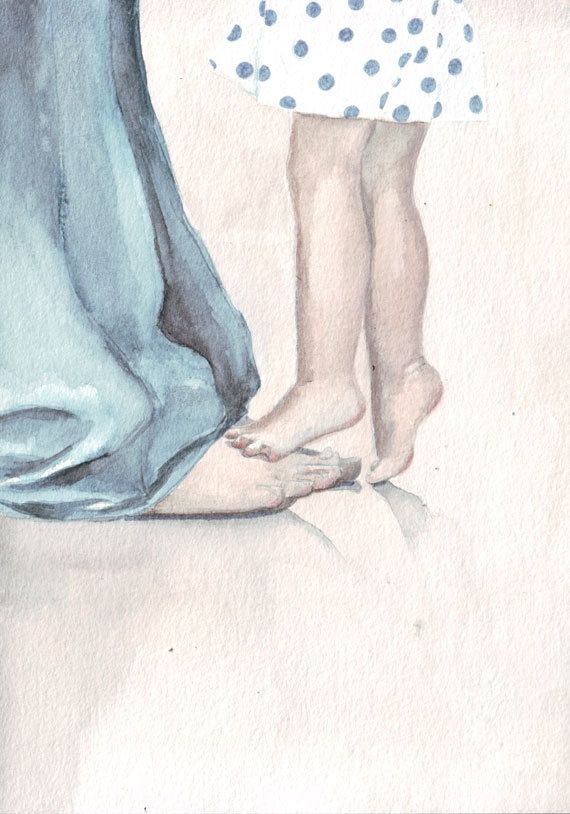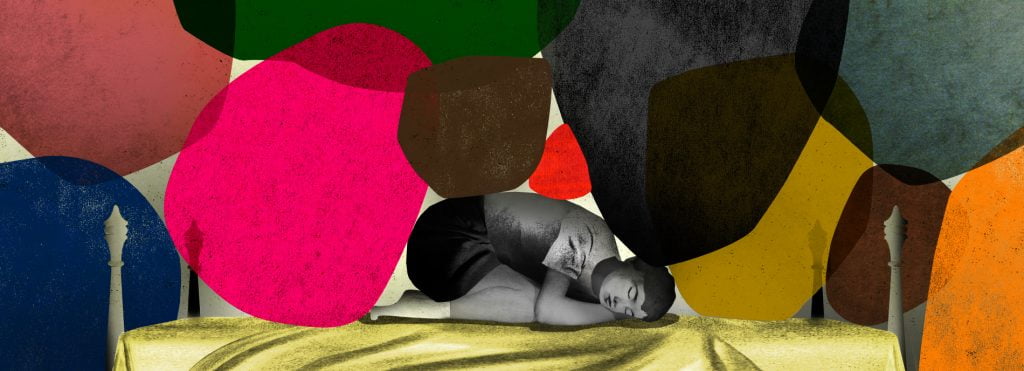Editor’s Note: This month, that is September 2020, FII’s #MoodOfTheMonth is Boys, Men and Masculinities, where we invite various articles to highlight the different experiences of masculinity that manifest themselves in our everyday lives and have either challenged, subverted or even perpetuated traditional forms of ‘manliness’. If you’d like to share your article, email us at pragya@feminisminindia.com.
Trigger warning: Depression, Suicidal Thoughts
I was 30 when my dadima (paternal grandmother) passed away. I wept but Abba didn’t cry at all, or at least not in our presence. He became silent and very busy arranging the most elaborate soyem (funeral gathering) for her. The only words that betrayed his loss were: Nobody likes to lose his mother. After the soyem, he went on with his life as if nothing had changed.

He continued to visit dadima’s grave on special occasions like Eid. When his marriage soured, he didn’t seek anybody’s help or advice. He sought solace in his work instead, and blamed my mother for all that had gone wrong. He didn’t discuss anything with anybody because that would have meant he was admitting his own vulnerability in messing up the marriage. He could never be at fault. Instead, he found younger fawning women who worshipped him. They found in him a sugar daddy. He was ambitious, having risen to prosperity from stark poverty. Now he became a workaholic. He worked harder than ever, made more money than ever, and had grown more and more alienated from us. When we were home, we still waited for him to come home so we could have dinner. We still enacted the ritualistic family dinners where nothing meaningful or truthful was brought up.
My father was a successful businessman. Then, he developed health problems. He aged. He had surgeries: Cataract. Hemorrhoids. Prostate. He became diabetic, hypertensive. But he faced everything with grim determination and with increasing reliance on ritualistic religion. As an aging man beset with a fading memory, he gradually receded into a world of his own. I don’t know what his innermost thoughts were. He kept them to himself, preferring to eat alone in his room. He withdrew further from us. In childhood, I revered and feared Abba, in adolescence I yearned for a closer relationship with Abba, but in adulthood, I grew more and more estranged from Abba.
“Depressed men often have troubles. It is frequently not they who are in conscious distress so much as the people who live with them.” That was Abba. Nothing was wrong with him. The sadder he became inside, the more angry, domineering, demanding and emotionally unavailable he became on the outside. He did everything that led to the collapse of his marriage. The cultural ideal of masculinity ensured that admitting to his real feelings was off limits.
Terrence Real, in his book on covert or hidden depression in men (I DON’T WANT TO TALK ABOUT IT: Overcoming the Secret Legacy of Male Depression) explains why depression in men is a hidden, masked illness. “Men are not supposed to be vulnerable. Men tend to manifest depression differently than women.” Men hide their depression because the disorder is seen as ‘unmanly’. From childhood onwards, writes Real, “boys are greatly encouraged to develop their public, assertive selves,” but at what cost? Boys are “systematically pushed away from the full exercise of emotional expressiveness and the skills for making and appreciating deep connection.”
That’s how Abba had been socialised to grow into manhood. Forming deep emotional connections wasn’t part of this socialisation. He was the son who took care of his parents, he was a responsible father who gave us the best education money could buy, and he was a husband who was a good provider. He was the quintessential ‘good man’.
The DSM (Diagnostic And Statistical Manual) criteria for diagnosing major clinical depression, includes prolonged presence of symptoms like: depressed mood every day, loss of interest in pleasurable activities including sex, excessive fatigue, significant weight loss or weight gain, too much or too little sleep, feelings of worthlessness, forgetfulness, inappropriate guilt, diminished concentration, indecisiveness, recurrent thoughts of death, or suicidal thoughts. In addition, people with depression may exhibit irritability, brooding, and obsessive rumination, anxiety, phobias, excessive worry over physical health, and complaints of pain.
So Do Depressed Men Manifest These Classical Signs of Depression?
Real writes, “Depressed men often have troubles. It is frequently not they who are in conscious distress so much as the people who live with them.” That was Abba. Nothing was wrong with him. The sadder he became inside, the more angry, domineering, demanding and emotionally unavailable he became on the outside. He did everything that led to the collapse of his marriage. The cultural ideal of masculinity ensured that admitting to his real feelings was off limits. Feeling sad is for ‘wimps’. It’s about shame.

“The manly denial of vulnerability” is so severe, writes Real, that most men deny and downplay their symptoms, to such an extent that this denial has become a major risk factor in men’s shorter life span. Masculine invulnerability shows little sign of abating. Most men die early because they do not take good care of themselves emotionally. Men are four times as likely to take their own lives as women. They’d rather kill themselves than reach out for help. Men often mask their depression through actions like withdrawal from relationships, angry outbursts, increased aggression, denial of pain, over-involvement in work or sports, increased risk-taking behaviours, self-medicating with alcohol, drugs and sex.
“The manly denial of vulnerability” is so severe, writes Real, that most men deny and downplay their symptoms, to such an extent that this denial has become a major risk factor in men’s shorter life span. Masculine invulnerability shows little sign of abating. Most men die early because they do not take good care of themselves emotionally.
Some men do try to reach out for help from other men, but they take huge risks. They risk being shamed and ridiculed. They’re not met with nurturing, caring and empathic listeners. Instead, they encounter hostility, and shaming. They’re told to ‘man up’. So it’s not a surprise if boys and men bury their depression in denial, overwork, alcohol and sex. Absence of close emotional relationships eventually leads to relational troubles.
Real says men are so good at “concealing their condition from the outside world, and those close to them and loved ones, that doctors and therapists may miss the diagnosis of overt depression.” Most men fail to get the help they need because they are never diagnosed with depression. The way they express depression does not ‘fit’ the diagnostic criteria of ‘classical’ depression. The prohibition on expressing vulnerable feelings leaves the man and the people around him ever more disconnected. I was reading Terrence Real’s book on male depression, but it felt I was reading about my father. It was as if the book had been written for Abba but if only he could read it.
It’s only in Abba’s twilight years that I began to see that he had been masking his depression for years. It is only then that I saw him as a lonely man in need of forgiveness, compassion and companionship. But how was I to communicate my own change of heart to him? I had been so angered by his repeated betrayal of my mother. In what language would I now say I understood? I forgave? I couldn’t walk into his room and hand him the Real book. I couldn’t throw my arms around him and say: Abba, I now understand. He was distant, seldom speaking of his feelings. Did he have any regrets? Doubts? Disappointments?
Neither one of us had the language in which to broach such feelings. Instead, what I did was to visit him, cook for him and do errands like find for him books of Urdu poetry that he asked for. Even though he was a diabetic, occasionally I made halwa. And quietly sat and watched him devour halwa at breakfast. It gave me the means to express what I couldn’t express in words. Sometimes we talked about a safe topic: politics. As long as his eyesight hadn’t failed, he read the newspaper, and he was always watching the news on TV. He had subscriptions to several magazines, and could analyse global politics quite well, but in later years despite magnifying glasses, the printed word became hard for him to negotiate.

We stayed on the safe surface of conversations, never letting the more troubling stuff bubble up through the surface. The cult of not broaching emotions was an insurmountable obstacle. I could blame my own hesitation, my lack of confidence and skills in the earlier years, and later in his old age and advancing dementia, a deeper formality, but the masculinity code that robs daughters of their fathers, robs most women of meaningful relationships with the men in their lives, had robbed me too. When we were growing up, we were frightened to ever raise our voice when speaking to Abba. We feared his displeasure. The possibility of an authentic and truly close relationship with him dwindled, and later, this became my truth with most men.
What Can a Middle-Aged Woman Advise Younger Men To Do?
To the men who are now becoming fathers, I say: Please start a men’s liberation movement for your sons. Please liberate them from the prison of gender roles that you too are probably trapped in. And to the boys, I say: start a boy’s movement to teach your younger brothers what it is to grow up to be a real man. Liberate yourself and your younger brothers from the trap of toxic masculinity, the kind of masculinity that prevents you from getting in touch with your own emotions, prevents you from being empathic, compassionate and companionate.
Do you not see how lonely it makes you? Sometimes it’s so lonely it makes you want to kill yourself. Do you not see how toxic it is for you? And even lonelier for the older men trapped in this well of loneliness? It’s not just the women who suffer because men aren’t fully human. It’s the men who suffer most from being half the men they could be.

Boys and men: let go of the temptations of power and domination. They are fake promises of the ‘boy code’. Real men don’t need to dominate, to be tough, competitive, settler of scores, revengeful, angry and violent. Real men can and must be gentle. Real men can be soft-hearted. Real men can cry. Real men express emotions and understand the emotions of others. Real men are nurturing towards those they love. Real men listen. Real men act from a place of love.
I’m not overly optimistic about quick reforms in the masculinity code. Henry Montero, a psychotherapist, writes about the contribution toxic masculinity is making to depression in men: “Consider the impact of societal ideals of masculinity. There’s a simplistic view that may be partially rooted in truth: women get sad, men get mad.” Check out this article.
But you can make a start by helping men and boys you love to name their feelings, to express their emotions. Montero says help the men “get rid of their hesitation in sharing their emotions. We must accept the fact that expressing emotion and crying are normal tendencies for all people, regardless of gender,” when you see a man trivialising the sadness other men and boys experience. Whey you see macho men say: why are you crying like a girl, stand up for men’s right to cry. There must be a reason nature gave tear glands to men, right?
Most men fail to get the help they need because they are never diagnosed with depression. The way they express depression does not ‘fit’ the diagnostic criteria of ‘classical’ depression. The prohibition on expressing vulnerable feelings leaves the man and the people around him ever more disconnected. I was reading Terrence Real’s book on male depression, but it felt I was reading about my father.
Be a man. Tell the men and boys who matter to you: aren’t you tired of your own shocking emotional illiteracy? Aren’t you tired of pretending to be a hero all the time? Not being able to openly talk about what hurts you? Aren’t you tired of those trite ways of covering up your emptiness—through overwork, alcohol, sex, drugs, aggression? Aren’t you tired of not being able to cook or dance or sew if you choose to? Aren’t you tired of being trapped in the prison of gender roles, unable to be yourself? Unable to know who you really are?
Emotional expression is as much your right as it is a woman’s. Boys and men, reclaim this fundamental right that has been snatched from you. Liberate yourself from the shackles of toxic patriarchy. Work to liberate yourself. Not as a favour to women, but for the sake of becoming a more authentic man. More authentic relationships with other men (brothers, fathers, sons) and the women in your life will flow as a natural outcome of your authentic self. Your authenticity will ensure a more sustainable future for all humankind.
Men, what are you waiting for? What’s preventing you from becoming a men’s rights activist? All men have the right to be more fully human. The right to more fully express the full range of human emotions. Without feeling ashamed. The right to learn new skills such as active listening. If not now, when?
Also read: The SSR Case Shows How Media Denies Mental Health Issues In…
Concluding Thoughts
It would’ve been a sign of strength, had Abba wept openly when his mother died. It would’ve been a sign of strength had he discussed his failing marriage with someone. His generation of men would’ve labeled him a wimp, biwi ka ghulam, kamzor (weak) or even a namard (sissy). But is this generation of men any different? But what if he had dared to take the risk? What if he didn’t have to be so damned manly? What if he asked for help? What if he had heart to heart talks with me or a friend? What if he made the choice to forego male prestige and power? Who knows what he would’ve gained.
Can the good men and boys of today show up without the guise of toughness and anger? And can they stop expecting all good women to be weak and feminine? Can we move beyond such ludicrous binaries?
Men, you can learn from various branches of feminism. The F-word is not anti-men. The F-word is anti-inequality, anti-domination, anti-injustice. One great and simple book men should read is Feminism is for Everybody by bell hooks. It’s available free online. One film you can watch is Jackson Katz’s excellent documentary on toxic traditional masculinity: Tough Guise.
Also read: Many Gay Men In India Experience Body Image Issues, And We…
I wish Abba had read the book or watched this film. I wish I could have liberated Abba from the prison of masculinity that robbed us both of our beautiful, rightful father-daughter relationship.
Nighat Gandhi is a psychotherapist and writer. She’s the author of WAITING: a collection of stories.
Featured Image Source: Star Tribune




